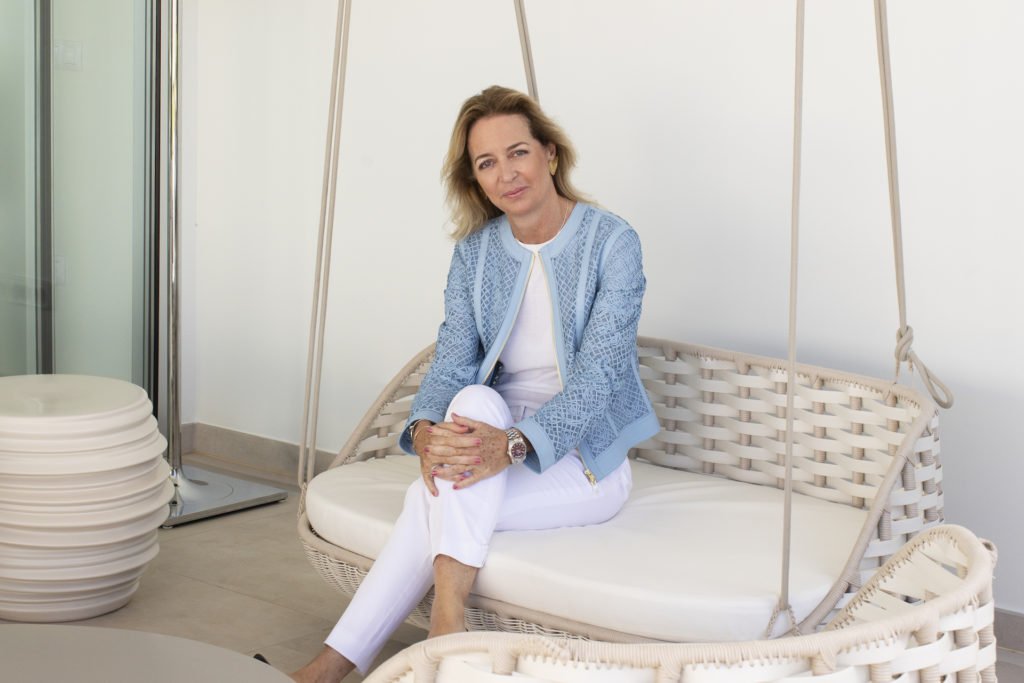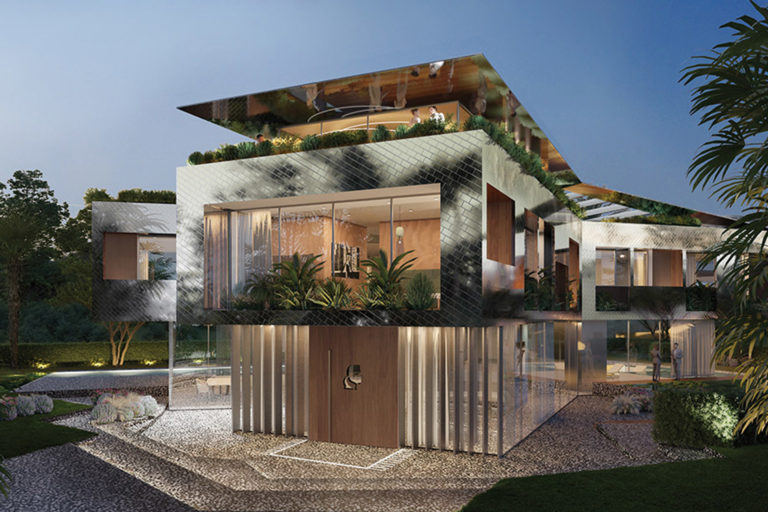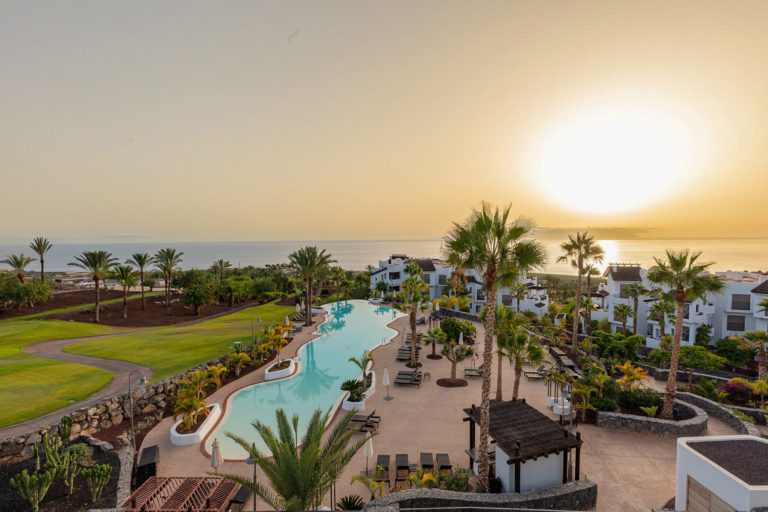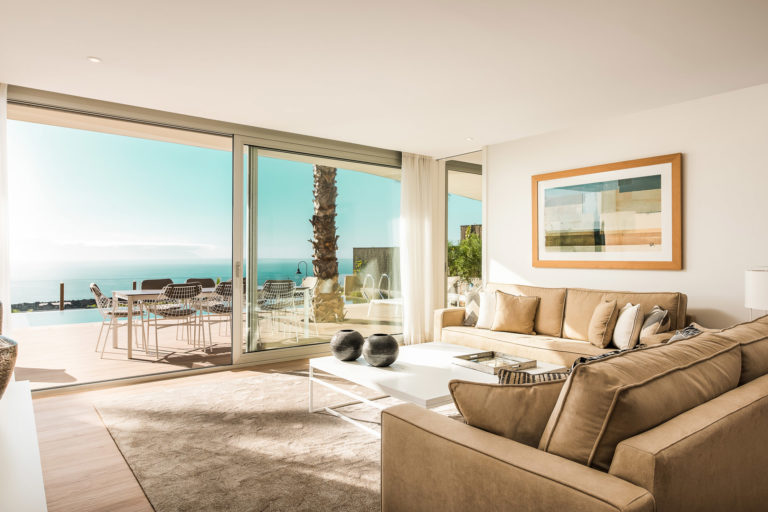
We’ll be analyzing the impact of the pandemic for years, but today we’re delving into its effects over the past months on luxury real estate marketing and sales, two of Arum Group’s primary activities. Like many businesses, we have found that for all the very serious challenges, the last two years have also presented opportunities. Timelines were moved up to respond to urgent needs. More was taken on than we believed possible. And the result of these demands has largely been to leave us stronger and better prepared to meet the future.
We take as an example one of our flagship projects, Abama Resort in Tenerife. This luxury resort features several five-star hotels, exclusive properties, an internationally renowned golf course, Michelin-star restaurants, and a full tennis center, among other facilities. It is currently the largest construction project in the Canary Islands, and the resort as a whole already has invested more than 500 million Euros into infrastructure, facilities, and new home construction. Arum has been involved with the project for more than 7 years, and is responsible for the promotion and sales of all residential units as well as the development of community facilities and owner relations.
Construction at Abama was never suspended during the pandemic, and with an existing community of over 250 families, there has been plenty to do. We sat down with Arum’s Director of Marketing and Communications, Elodie Casolà, as she explained some of the effects that Covid has had on Arum’s work at Abama, and how sales and marketing tactics and expectations have adapted to the new normal.
The pandemic completely changed our expectations about traveling easily from country to country. How has this affected projections of real estate sales to foreigners in Spain in the short, medium, and long term?
There have certainly been important changes in travel. People have not been able to move as easily as they used to, not only because of the restrictions imposed and recommended by governments, but also due to fear of the pandemic being uncontrolled in some destinations. In the case of Abama, we have seen several direct consequences of this, but we have also noted that our potential buyers have spent much more time, in their countries of origin, examining and analyzing the information that we have sent them about our facilities and products. They have asked us for many more details, both architectural and graphic, in order to understand and even make decisions from a distance. The result has been that when they have finally been able to come – still slowly and cautiously – a large part of their “homework” has already been done and they are already close to a purchase decision. The on-site visits have almost been formalities, just to verify that everything that they saw from a distance is real. There are very few surprise or improvised purchases like we saw before the pandemic.
The luxury sector tends to move at a different pace from conventional ones. Has this been true of residential sales during the pandemic as well?
In our case, we’ve found that the luxury buyer hasn’t felt as threatened by the pandemic vis-à-vis a purchase decision as the customer of a more standard product might. In fact, the possibility of retiring or taking refuge in a place where quality, control and security are more dependable than in an open residential community makes our resort even more attractive. Our clients can pay more for security and additional services in their homes for family and friends, and are willing to do so. There is maybe a parallel with the yacht sector, in terms of giving the HNWI the security of being protected from close personal contact with strangers.
What are the main challenges the teams have faced in trying to work remotely with buyers abroad?
Our focus throughout the pandemic has been to transmit the ambiance of our resort and all its qualities to our future clients, even when they have been stuck at home. We’ve offered them yoga, Pilates, cooking, decorating suggestions…just the little things that Abama does well, with the aim of making them feel like a part of the experience is with them, even if they can’t travel. We have been more creative than ever with our videos, virtual tours, online webinars, recordings, renders… We have taken advantage of everything that technology can offer. The key has been stepping up our communication and relating everything that was happening in the resort so our owners feel connected even when there is distance and time away from Abama.
When people consider buying a luxury home, aspects like the destination or the available leisure and dining experiences have an enormous influence on the final decision. What can you do to highlight these important features of a community when it’s not possible to travel to the property?
We do it by leveraging graphic material that showcases these features in an attractive and eloquent way. Social networks have played a fundamental role, allowing us to publish bits of information and messages every day to bring us closer to our audience. They can look at a beautiful photo of Abama while eating breakfast, see what’s on the menu at Melvin, do one of our recorded yoga classes, and catch glimpses of the properties, the golf course, the fauna and flora of the island. We’ve focused as well on transmitting positive messages and looking for ways to support the local community through charity actions and other efforts.
Along these lines, what role do branding communication tools play in overcoming the limitation of distance?
As I said, social networks have been very important, and with many people isolated at home during the pandemic, they have really become part of the fiber of our communications. They’re here to stay and part of our daily communication with our public. That won’t change, even when travel is normalized.
Have you developed new sales tools because of the challenges presented by the pandemic?
Yes. We have rethought and overhauled our approach to virtual tours, renders, digital plans, webinars, videos, video conferences and podcasts, among other tools. They allow the customer to get to know the product in a much deeper way if they can’t do an on-site visit.
Would you say that the pandemic accelerated the digital transformation of luxury residential real estate sales?
We have absolutely had to accelerate our transformation and offer real estate innovation services during the pandemic. We supplemented our digital activity by hiring more teams, increasing the budget… This has, in large part, compensated for having to work and communicate remotely. It’s clear that the companies that haven’t prioritized this process have been left behind.
The lockdown was a particularly difficult period. What was the experience like at Abama with regard to the owners who stayed at the resort and those who were away, as well as the investors interested in buying property?
We had an average of 25 to 30 families living at Abama at any point during the lockdown. This was another of our major priorities: to make these residents feel comfortable, protected and informed at all times. Our Owner Relations Manager was in constant contact with them for any personal or professional needs that arose. Our owners have always been our greatest ambassadors and we didn’t want them to feel abandoned. Many of the resort facilities were open throughout the pandemic to provide hotel services, restaurant service, golf, etc.
This experience has also been an opportunity to reflect on and strengthen the bonds between the resort and local communities. What initiatives have been put into place?
During the pandemic we formerly established a charity organization at Abama: Abama Solidaria. Our actions up until the pandemic had been a bit more ad hoc, but we took advantage of the extra time we had to formerly set up a permanent channel for charitable donations, and to establish a calendar of drives. Our first objective was to support the neediest families that live near the resort, especially those with children. We promoted several campaigns during the lockdown and we had an extraordinary response from our owners. They mobilized like never before and exceeded all our expectations. The overall result has been a much closer relationship with the island community at large and much more direct interaction with NGOs and other organizations that are doing important social work on Tenerife.
The lockdown made people in many different countries rethink their priorities for their home lives. What do you feel investors are looking for now in a second home?
They’re looking for an extraordinary destination that’s not too far from their home country. It should be a safe environment that offers good service, and it should be managed by a dependable developer with high quality standards, a predictable construction timetable, and a solid future.
Have you noted an increase in the number of people seeking properties in destinations away from cities where they can work remotely?
Yes, thanks to remote work, we have new clients who are no longer anchored to an office. They are free to live and work anywhere, and a resort is an ideal base because there are numerous services available to residents, as well as sport facilities and wellness activities. Resorts are usually located in a place of extraordinary natural beauty, often near the sea and offering good weather, and this means you can lead a healthy outdoor life while living in peace and working from home.
In some cases, resorts also have special or unique features. Abama, for example, has the only Bach Care cardiovascular center in Europe. Top heart specialists and support teams work here with the most advanced cardiovascular diagnostic equipment of its kind, and our guests and residents can combine health services with holidays. The Canary Islands also offer tax breaks and incentives for certain business industries that are one-of-a-kind, and these are important considerations when choosing the location for a second home.
Despite the pandemic having clearly set the agenda over the past months, in a sector as complex as this one, you always have to be aware of and making decisions about new trends. Where is the market going, and what are the new demands?
Up until the pandemic, the average stay of our residents at the resort was between one and three months a year, but we have noticed that these periods are increasing. In the context of more remote work and less frequent travel, we have to think about the needs of our community. We have already gone into action, and are constructing more common space to meet, dine, and enjoy leisure time without leaving the resort. The new Plaza Abama will offer restaurants, bars, wellness facilities, a gym, boutiques, a swimming pool, and gardens and terraces with wonderful views. We want to reinforce the feeling of community that our owners need.
How has Brexit affected the market of interested buyers? Is the UK still one of the main markets or have other opportunities emerged?
The activation of Brexit, together with the pandemic and the United Kingdom’s management of the situation, has somewhat affected the predominance of this market. We still have plenty of interest among UK buyers, but the percentage of sales to other markets, such as German-speaking countries like Germany, Austria, and Switzerland, has increased substantially.
Luxury real estate will of course continue to be of interest in the UK and in many other countries that are currently still under travel or other restrictions. But one of our biggest takeaways from these past two years is a new flexibility in our marketing tactics and a more agile approach to campaigns and communication. And this knowledge will serve our real estate innovation objectives for years to come.



